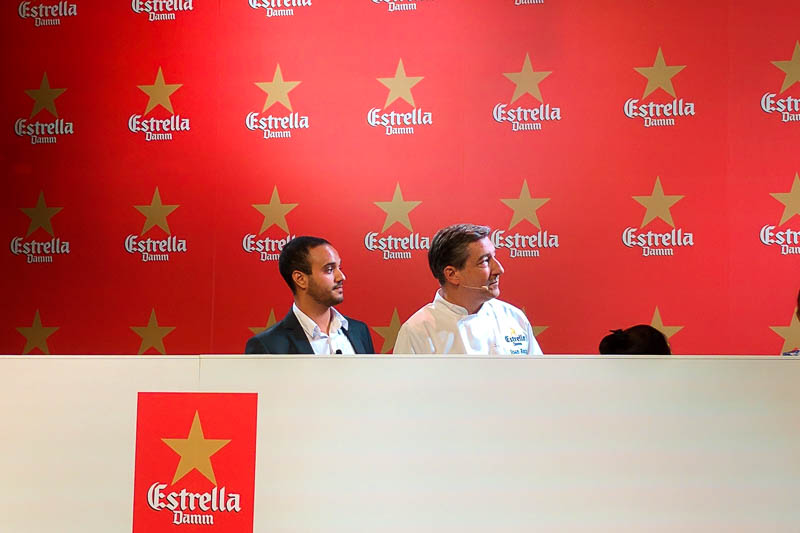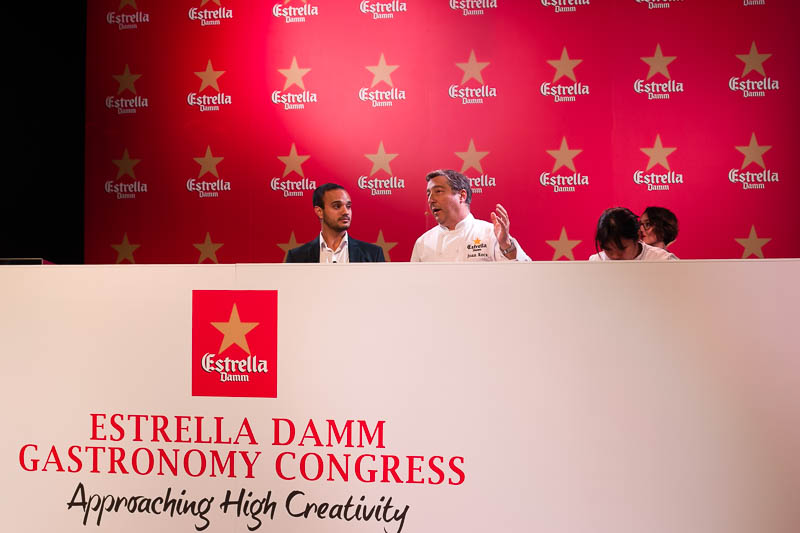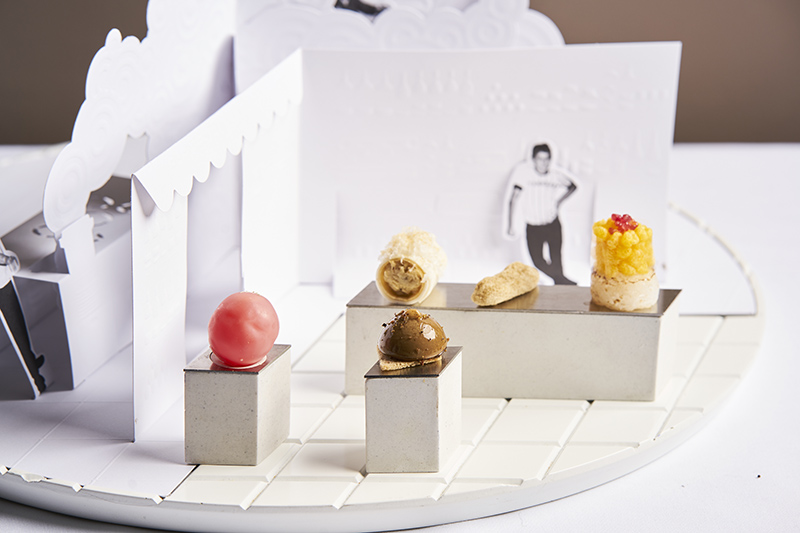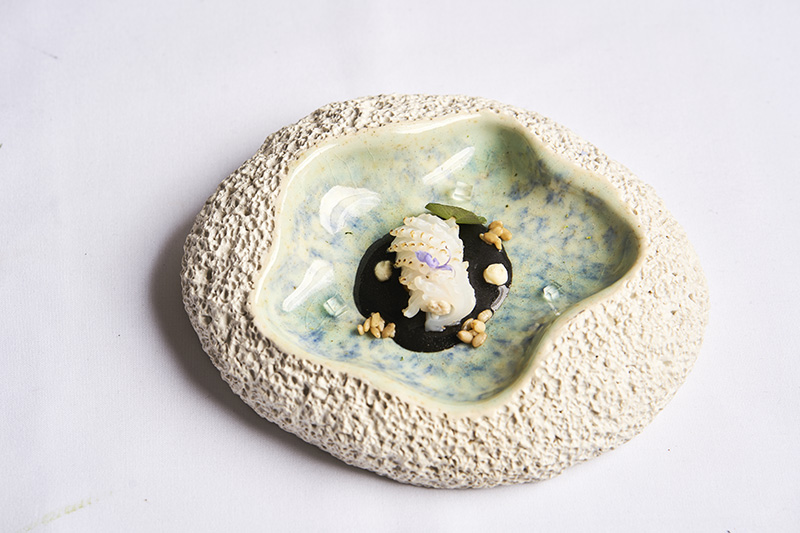[content_slider]
[content_slide]

[/content_slide]
[content_slide]

[/content_slide]
[content_slide]

[/content_slide]
[content_slide]

[/content_slide]
[/content_slider]
MELBOURNE | As Melbourne Food & Wine Festival and The World’s 50 Best Restaurants awards hit Melbourne this week, there’s a lot of action going on around the city. Top chefs, food influencers, and media from around the world have descended on Melbourne and it’s hard avoid the electric buzz in the air. As part of the festivities, the Estrella Damm Gastronomy Congress was held in Australia for the first time, and featured some of the world’s most renowned chefs giving cooking demonstrations of some of their signature dishes while sharing stories.
This year’s Gastronomy Congress featured Joan Roca from last year’s World’s 50 Best Number 2 Restaurant, three Michelin Starred El Celler de Can Roca, Peruvian chef and restaurateur Virgillio Martínez from the World’s 50 Best Number 4 Restaurant, one Michelin Starred Central, Albert Adrià from World’s 50 Best Number 29 Restaurant, one Michelin Starred Tickets in Barcelona, and Jock Zonfrillo from Adelaide Restaurant Orana, which was named Restaurant of the Year at The Advertiser Food Awards in 2014 and 2016.
I was given the opportunity to interview both Roca and Adrià after the event, and was keen to meet up with the two culinary masters and find out a bit more about what makes them tick.
First up was Roca, who lives up to his reputation as one of the industry’s ‘nice guys’. Roca’s food is characterised by creativity, respect for small producers, ingredients and people, and the ability to balance tradition and modernity. Extremely humble despite his many successes, Roca lives with his family in his hometown, Girona, above El Celler de Can Roca, which he runs with his brothers Josep (sommelier) and Jordi (pastry chef). His parents run a small, traditional restaurant, Can Roca, just around the corner from El Celler de Can Roca, and Roca and the staff go there for lunch every day.
“It’s not easy to synthesise the flavours of Australia in one bite.”
One of the opening courses at El Celler de Can Roca is ‘The World’, which features an assortment of tapa inspired by Roca’s travels. Roca told me that this is a course that’s constantly evolving based on his recent travels and new inspiration. Having visited Australia twice in the past six months, I asked Roca if diners could expect to see Australian influences creep into this, and other courses at El Celler de Can Roca. “For sure”, Roca responded, with an excitement about the discoveries to be made while here, and where that could lead. “It’s not easy to synthesise the flavours of Australia in one bite” Roca told me, but he’s a man who likes a challenge. An upcoming dinner at Attica is sure to provide inspiration, as is the work of Jock Zonfrillo who cooked a few interesting dishes using native Australian ingredients and techniques at this Congress.
Australia has always had outstanding produce, but it’s remained a secret to much of the outside world until relatively recently. Roca told me that he had a sense that Australia’s gastronomy movement is really at the start of something big. He has noticed ever increasing numbers of chefs visiting Australia, drawing inspiration from our produce, unique native ingredients, and innovation borne from our multicultural diversity. It surprises me that foreign chefs who visit these shores seem to take a greater interest in discovering native Australian ingredients than many Australian born chefs. I suppose it’s a combination of our relatively young gastronomic culture being influenced by those who have immigrated here, rather than our first peoples.
“It’s important to look at tradition from different angles.”
It’s easy to see how one might draw inspiration from new, foreign ingredients, but I was curious as to how Roca continues to draw inspiration from ingredients closer to home in Catalonia. For Roca, it’s about balancing many sources of inspiration. Tradition is important, but it’s just one of the ways to look at food, and by ‘putting on different lenses’, Roca is able to look at the familiar in a different light. There’s what he learns when he travels and discovers new ingredients and techniques, and more recently, there’s a greater focus on understanding plants. Roca told me that there is now a botanical specialist in the El Celler de Can Roca team, and through the restaurant’s Terra Animada research programme, more than 3,000 wild species of plants have been identified and catalogued for reintroduction in gastronomy. Old ingredients, new ways of looking at them.
Another big influence is family. All three Roca brothers list their mother’s cooking as one of their strongest influences, and I was interested to find out if Roca’s children share a passion for cooking. While they’re still quite young and finding their own way in the world, his oldest son, who is studying politics, has shown an interest in learning to cook traditional dishes from his mother, so who knows where that could lead.
Despite the constant questioning and potential cash that could be made, Catalonia and the ‘brightness of the Mediterranean’ is at the heart of what Roca does, and he has no plans to open any other restaurants. However, for around six weeks each year, El Celler de Can Roca closes its doors while Roca and the entire team take the restaurant ‘on tour’ around the world. When I asked Roca whether we’ll ever see El Celler de Can Roca tour Australia, the answer was a simple “why not?” We can only hope.
Keep an eye out on The City Lane for my interview with Albert Adrià, which goes live tomorrow.

